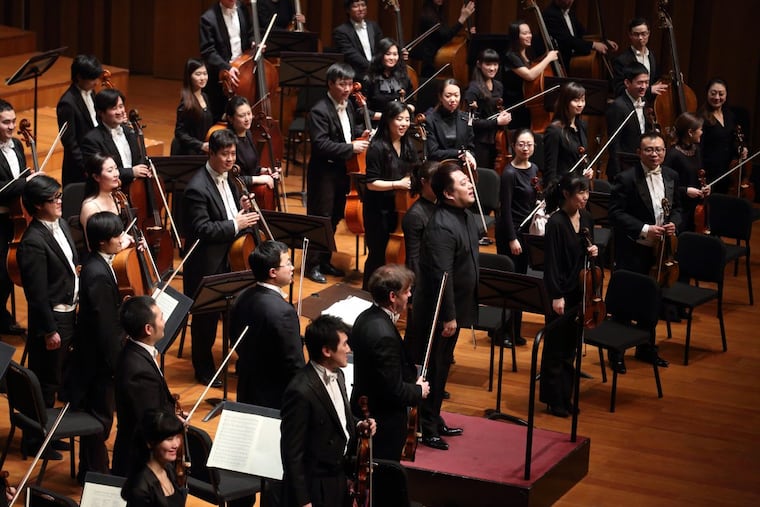Chinese orchestra shows a rich new sound - and a flair for outreach
The National Centre for the Performing Arts Orchestra from Beijing played a half-Chinese, half-Brahms program Wednesday at the Kimmel Center for a largely nonclassical audience.

Beijing's National Centre for the Performing Arts Orchestra couldn't come to town Wednesday and just play a concert. Besides its program at the Kimmel Center, the orchestra kept busy symbolizing many things: the new China, the burgeoning interest in classical music there, and the ongoing cultural exchange fostered by the Philadelphia Orchestra's near-yearly visits to Beijing.
A high-level diplomatic luncheon was held, speeches were made, and gifts were handed around. Walter Douglas, U.S. deputy assistant secretary of state for public affairs, applauded both the Beijing and the Philadelphia Orchestras for creating "a connection that goes beyond the official level." In Chinatown, the NCPA String Quartet played a lovely free lunchtime concert to a small but extremely attentive audience at the Chinese Christian Church.
And then, at the Kimmel Center concert? Well, the ensemble from the People's Republic put on a show for the people, with a low general-admission price of $35.
The mostly Asian audience arrived with extended families. Roughly 20 percent of the crowd in the fairly full Verizon Hall was kids under 14.
Young or old, many hadn't been there before. They didn't know their way around. The freewheeling, pleasantly unruly concert was an outreach dream, despite ushers being frazzled by some guests' guileless inability to put away their camera phones. Or shut them off. Calls interrupted the music. Kids wailed and coughed during quiet reflective cadenzas. Many people clapped between movements of the Brahms Symphony No. 4.
Musically, the performances were close to the real thing — maybe not world-class, but headed there — even if the repertoire outside of Brahms was questionable. The first piece — Zhao Jiping's Violin Concerto No. 1 — was played with great conviction by soloist Ning Feng, though this composer of film scores and works for the Silk Road Ensemble didn't really assert his own compositional voice. The piece touched base with many classical points of reference, which is helpful for audiences still finding their way into the medium but not for a tour of musical capitals such as Philadelphia and New York (where the orchestra played this week).
The other Chinese piece was quite substantial but posed the opposite challenge: Chen Qigang's Reflection of a Vanished Time for Cello and Orchestra, heard in its U.S. premiere, was a deeply introspective work that reflected the composer's studies with the late Olivier Messiaen. The piece is variations on a traditional Chinese song, but handled obliquely in ways that felt like a collage of musical objects, often punctuated by enigmatic silence. The soloist was the celebrated Gautier Capucon, who delivered some of the most delicate, nuanced cello playing I've ever heard. He clearly loves the piece — and held the score up during the ovations.
The Brahms performance under music director Lü Jia was a good litmus test for how far the orchestra has come since its 2014 American tour, when it played well but with a sound that was somewhat colorless and lacking personality. In the first movement of the Brahms, I feared the orchestra hadn't progressed much: The performance was careful and correct — with a few muffed entrances that can be attributed to tour fatigue. Melodies were phrased with good musical instincts, but the rhythms didn't have much to say.
Yet the second and third movements sounded like a different orchestra: The sound was rich and the players had clearly taken the music to heart. Therein lies the challenge: Brahms can be handled by most any accomplished musician, but this composer requires performers to have a personal relationship to the music, one that touches their innermost being.